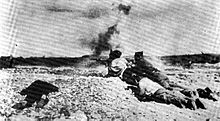Our website is made possible by displaying online advertisements to our visitors.
Please consider supporting us by disabling your ad blocker.
Yugoslav volunteers in the Spanish Civil War
You can help expand this article with text translated from the corresponding article in Spanish. (March 2012) Click [show] for important translation instructions.
|


The Yugoslav volunteers in the Spanish Civil War, known as Spanish fighters (Croatian: Španjolski borci, Slovene: Španski borci, Serbian: Шпански борци / Španski borci) and Yugoslav brigadistas (Spanish: brigadistas yugoslavos), was a contingent of volunteers from the Kingdom of Yugoslavia that fought for the Republicans (in support of the Second Spanish Republic) during the Spanish Civil War (1936–1939).
An estimated 1,664[1] "Yugoslav brigadistas" fought in the war, including about 800 who were killed in action. According to Spanish statistics, 148 Yugoslav volunteers received the officer rank during the conflict.
Most of them fought in the battalions Dimitrov and Đuro Đaković of the International Brigades, and many of them participated and perished during the Battle of Ebro in 1938. They were recruited by the outlawed Communist Party of Yugoslavia (KPJ) in their home regions, or through the recruitment centre of the Comintern that Josip Broz Tito managed in Paris. There were four airmen among the volunteers, the most notable being fighter pilot Božidar "Boško" Petrović who attained the status of "flying ace."
After the war, those who managed to flee across the Pyrenees fell captive in internment camps in France, with many being repatriated illegally by the Yugoslav communist organisation. Some of them later became leaders of the resistance against the Nazi occupation.
Three former members of the International Brigades ended up commanding armies of the Yugoslav Partisans during World War II: Peko Dapčević (1913–1999), Kosta Nađ (1911–1986) and Petar Drapšin (1914–1945). Koča Popović (1908–1992) was another prominent Partisan commander who fought for the Spanish Republicans.[2]
- ^ Asociación Brigadistas Yugoslavos "Naši Španci Archived October 16, 2010, at the Wayback Machine" Retrieved 2012-02-29
- ^ Lenninists "International Solidarity With the Spanish Republic 1936•1939. Yugoslavia Archived August 24, 2011, at the Wayback Machine" Retrieved 2012-02-29
Previous Page Next Page
Югаслаўскія добраахвотнікі ў Іспаніі BE Brigadistas yugoslavos en la guerra civil española Spanish Brigadiers yougoslaves dans la guerre civile espagnole French Jugoslavenski dragovoljci u Španjolskom građanskom ratu Croatian Voluntários iugoslavos na Guerra Civil Espanhola Portuguese Югославские добровольцы в Испании Russian Jugoslaveni u Španskom građanskom ratu SH Španski borci SL Југословени у Шпанском грађанском рату Serbian


